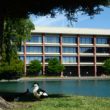FAIRFIELD — China, the presidential election and, of course, the whims of Wall Street could have significant effects on the Solano County economy.
That was one of the primary messages given to business leaders by economist Robert Eyler at the annual Solano Economic Development Corporation breakfast this spring at the Hilton Garden Inn.
“The news is good . . . (but) there are still a lot of challenges,” said Eyler, president of Economic Forensics and Analytics in Petaluma. “Those challenges are global, national and state that Solano has to absorb.”
Eyler in an interview after his presentation of his 2015 Index of Economic and Community Progress said some of his specific concerns are China’s position in the economic market; whether Europe will be more stable, particularly in light of the terrorist attacks in the recent past; and how American businesses will react to interest rates as they likely will climb.
In addition to those points, he also noted the presidential election and his concerns that the business climate will become more uncertain and “grind the economy” to a near halt in the coming months.
Eyler also emphasized the need for Solano County to recognize the regional nature of its economy, including the fact that more people leave the county to work than come in for jobs.
“Is that a bad thing?” he asked.
The answer, like many points on the economy, was yes and no.
The good part is that people are bringing back generally better incomes than they apparently can find in the county. The negatives include a drain on workforce talent and traffic congestion.
At the same time, job growth is at an all-time level in Solano County, Eyler reported. Similarly, the housing market is on the upswing.
The single biggest reaction from the crowd, however, was the news that local schools have a better graduation rate and a lower dropout rate than that of the state. In his presentation to the Board of Supervisors earlier this month, he said those numbers are the best since 2003.
How that translates to the kind of skilled workforce local employers are looking for is not entirely known.
Moreover, Eyler expressed concern about how a forced minimum wage hike to $15 an hour will affect that growth, particularly in a county where small businesses drive so much of the economy. Eyler also emphasized that the impact of the drought on the local economy goes far beyond agriculture, adding it is not just an issue of how much rain the state gets.
“The reality is we have an archaic way of distributing water,” he said. “It really is a water systems issue.”
Resident survey supports forecast
Meanwhile a survey this spring of Bay Area residents – including Solano County – indicates that they believe the regional economy is doing better than the nation as a whole.
“Overall, 70 percent of respondents believe the local economy is performing better than the national economy, with (nearly) eight out of 10 residents [79 percent] also stating that the area is continuing to get more prosperous,” the survey by Charles Schwab states.
And according to Eyler, perception does in fact match the reality.
“Generally, the data shows that it is true,” Eyler said.
Eyler said the region is showing job growth, housing prices are on the rise and car sales are up as well.
“People are spending,” he said.
The immediate economy aside, 86 percent of the survey respondents also believe the cost of living is “unreasonable,” and 55 percent of those surveyed said living in the Bay Area makes it more difficult to reach their financial goals.
Additionally, 32 percent gives the region an “F” as a place in which recent graduates can afford to live. The results also show that 69 percent think it is a bad place for retirees.
“It’s no surprise residents think it’s expensive to live here,” Richard Zak, a regional Charles Schwab branch executive based in San Mateo, states as part of the survey released this spring.
The survey polled 1,000 residents, ages 21 to 75, in a seven-county area.
The survey indicates 79 percent “believe the Bay Area is becoming more prosperous, while only 52 percent can say that of the rest of the country.”
Eighty percent view the Bay Area as a good place for career growth; 78 percent view it as a good place for young professionals; and 75 percent think it is a good location for entrepreneurs.
The survey also indicates that respondents believe they need a net worth of $1.4 million “to feel financially comfortable, which is 66 percent more than the broader U.S.”
Moreover, respondents said that while a net worth of $2.5 million would make someone wealthy in other parts of the nation, to reach that status in the Bay Area, the figure would need to be $6 million.
Respondents believe three of the biggest negatives to the region’s economic growth are real estate prices, traffic and overcrowding.





